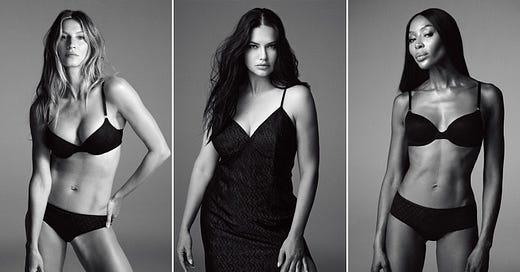Underwear, Activism and the Crushing Boredom of Modern Marketing
At Victoria's Secret, activism is out and the supermodels the company ditched two years ago are once again cool
Peak Notions hit the 3000 subscriber mark earlier this week. I’m astonished, and so grateful. If you value Peak Notions and find it useful, beneficial or thought-provoking, the best way to support its continued creation is by taking out a paid subscription. This will give you access to bonus writing, audio content, and the weekly app chat and monthly bo…
Keep reading with a 7-day free trial
Subscribe to Peak Notions with Laura Kennedy to keep reading this post and get 7 days of free access to the full post archives.




